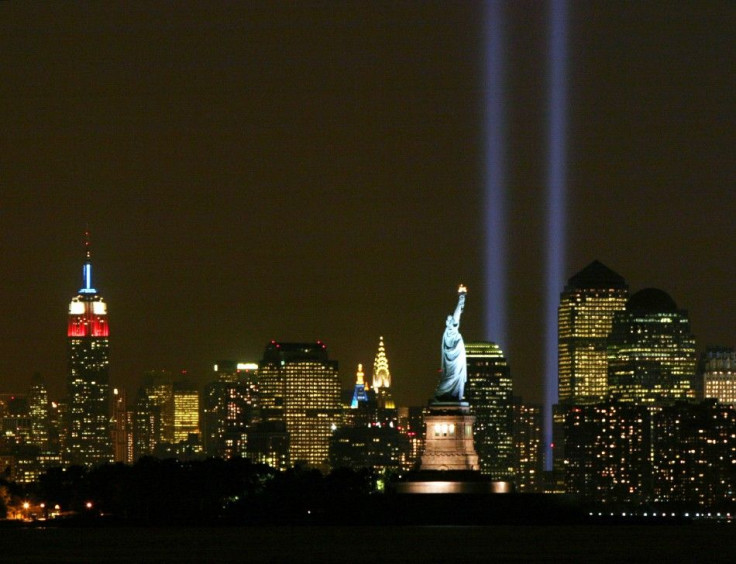9/11 - A Child's Experience of the Attacks

On Sept. 11, 2001, I was 11 years old. I was a seventh grader at a small middle school in Montclair, N.J., a commuter town 12 miles west of the Lincoln Tunnel. My dad worked in Manhattan, and so did most of my friends' parents.
We didn't know what had happened until around 1 p.m. I'm sure the principal was trying to postpone telling us for as long as he could, but parents were flooding into the school to pick up their children, so everyone knew something serious was going on. Finally, he gathered us, one grade at a time, in an empty math classroom. He told us the World Trade Center had been bombed. There was no mention of planes.
I had no idea what he was talking about. The name World Trade Center didn't mean anything to me -- I had known it only as the Twin Towers. I thought, fleetingly, that if I hadn't even heard the name, it couldn't be that important a building. But when I looked over at a friend to see if she understood, her face was white. Her father worked for American Express in 7 World Trade Center. He was all right -- in fact, he was still on the PATH train when the first plane hit because my friend had overslept that morning and made him late -- but she wouldn't know that for more than a day.
I didn't know if my father's office was near the World Trade Center, whatever that was. So I went to my homeroom teacher, told her my father worked at 70 Broadway and asked if that was close. I still haven't forgotten her expression as she tried to decide how to answer: Yes, he's a five-minute walk away? What are you supposed to say to an 11-year-old? Finally she settled on the most noncommittal answer she could get away with, which was something like, Well, he's pretty close, yeah.
My father was fine, and when he got home, I asked him how he had escaped. I told him my teacher had said 70 Broadway was really close to the World Trade Center. His response: It's 770 Broadway, Maggie!
So he hadn't been in danger at all. But in that moment at school, I took he's pretty close, yeah to mean he's probably dead, and I panicked. I used the classroom phone to call his office, but the lines in New York were all down and I couldn't reach him. I called repeatedly and left voicemails, begging him to call back, until my teacher finally took the phone away from me.
Then I went back to my desk and joined my classmates in sitting, sitting, sitting, waiting for our parents to pick us up. One of the administrators, I don't remember who, pulled me and a classmate into the hallway and said, Now, this doesn't mean anything is wrong, but we haven't been able to reach either of your parents.
I still don't understand why she told us that -- it made the panic and sense of helplessness unbearable. I hadn't even considered the possibility that my mother might be in danger, because she didn't work in the city. As it turned out, she was perfectly safe, but a lot of good that did me as I sat at my desk, unable to reach my parents and thinking my dad worked a stone's throw from Ground Zero.
I sat for two hours in the increasingly silent classroom, fidgeting and digging my nails into my face from nerves. When the classroom phone finally rang, I jumped and ran to it, almost grabbing it from my teacher. It was my father, and I burst into tears and asked him if he knew what had happened -- still not realizing how big it was, and how impossible it would have been for anyone not to know.
As a kid, you never feel like you're too young to understand. You think you can grasp things just as well as grown-ups, and you don't like to be patronized. Even up until I was 15 or so, I would react defensively when people said to me, Oh, wow, you were only 11? I can't even imagine what it would have been like to experience it that young. Even if I didn't realize what the World Trade Center was until I saw the photo on the front page of The New York Times the next day, I still thought I understood how serious the attacks were.
I can't say when exactly I realized how young 11 had been to understand the enormity of 9/11. But 10 years removed, I see it. For me, the world isn't divided into before and after the attacks, because there is no before.
Sure, I remember plenty from before I was 11, but not the things that 9/11 changed. I didn't see how startling the airline restrictions and the Patriot Act and the rest of the changes in the name of homeland security were, because I hadn't been paying attention before the attacks. I knew what the post-9/11 world was like, and I certainly knew it had changed the country, but I never had that acute, visceral sense of a dividing line.
It also seems a lot longer ago to me, I think, than it does to others. For many people, it's hard to believe that 10 years have passed already. But for me, it's hard to believe it's been only 10 years.
That day in my middle-school classroom seems incredibly distant, maybe because I've lived nearly as many years since 9/11 as before it. The difference between 11 and 21 is much more dramatic than the difference between 40 and 50.
Just as I had a radically different experience of the day itself because of my age, I have a very different perception of the time that has passed since.
© Copyright IBTimes 2024. All rights reserved.





















